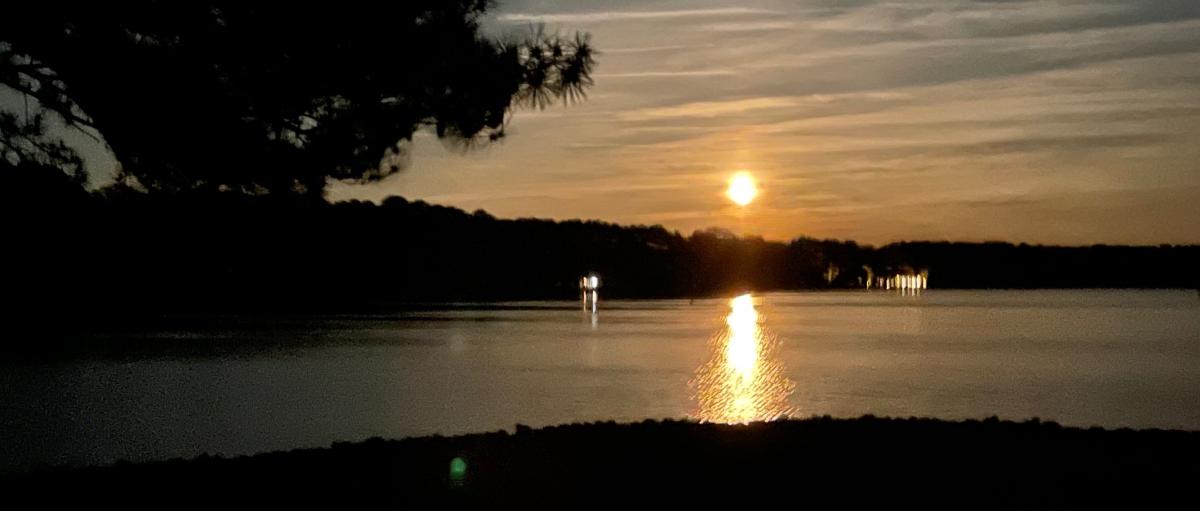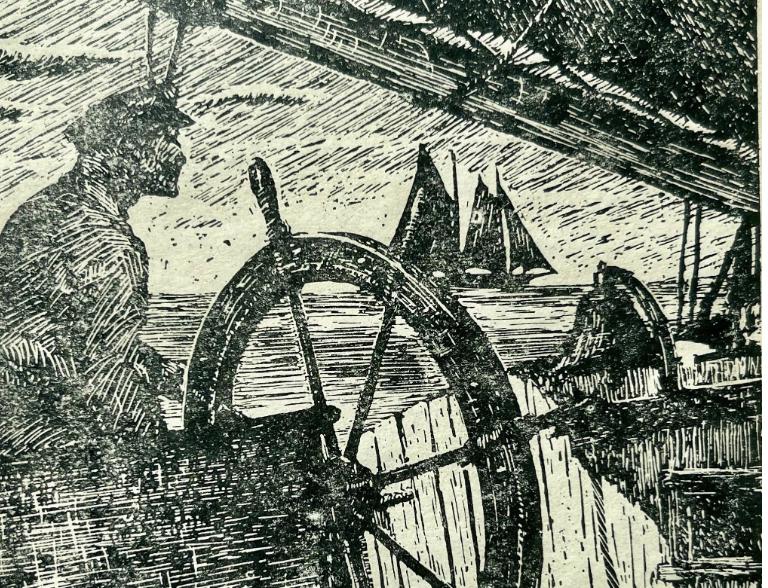Last week’s column focused on the Chesapeake Bay pilots and the travails of the container vessel Everforward, now freed from her grounded birth off the mouth of the Patapsco River and the port of Baltimore.

This wood cut engraving by noted Delmarva artist John Moll accompanies Gilbert Byron’s poem The Pilots of Lewes in the author’s 1940s collection titled Delaware Poems. Thanks to my friend Hazel Brittingham for the print of the engraving. Moll, who lived for many years in Oxford, provided many illustrations for Byron’s work including his renowned novel The Lord’s Oysters.
Tugs pulled her free over the Easter holiday after several hundred containers had been removed to barges by a brave crane operator. Like a bird cut loose from trapping hands or a young boy’s awkward snare, the vessel and her crew made a quick departure from her shameful, broad daylight posture visible from hundreds of thousands of passengers looking northward as they made their westward crossing of the bay bridge. Off she went to Norfolk with her abbreviated load of containers.
That departure ended her expensive, month-long grounding. Fortunately, other than the expense and logistics of resolving the mishap, the grounding caused no other problems, especially environmental.
While that chapter of the saga has ended, an investigation into the cause of the grounding continues. The U.S. Coast Guard is leading the investigation. I look
forward to hearing the results and discussion of any changes that have been made to ensure any further such incidents – jeopardizing shipping logistics and the Chesapeake’s fragile environment – can be avoided.
Bay pilots and their navigational skills and adventures have long been a part of the Chesapeake and Delaware bays’ maritime culture.
Prominent Delmarva author Gilbert Byron wrote poems about the pilots, especially those of Delaware Bay, when he taught in Lewes where many pilots live and operate from.
In the early days of piloting, foul weather in the mouth of the notoriously rough Delaware occasionally prevented pilots from disembarking outbound vessels to get ashore to their homes in Lewes. In that case, pilots had no choice but to go with the flow of an unscheduled vacation and get off at the next port to find a return voyage.
Byron wrote a poem in 1943 called The Missing Pilot that details one such adventure and chronicles in verse the treacherous side of life at sea. The poem is included in a 1993 collection titled Gilbert Byron: Selected Poems, published by Washington College’s Literary House Press. For your reading enjoyment, here is that poem:
THE MISSING PILOT
The brigantine was flying south,
Past Ship John, down the bay;
The pilot knew the treacherous route,
He hoped by the end of the day,
To leave the ship
On the pilot skiff,
And sup down Lewes way.
The northeast wind began to rise
And was building up the sea,
So the pilot, ever weatherwise,
Decided to seek a lee;
Behind the breakwater,
Strong stone and mortar,
Where the pilot boat would be.
And as the sun was going down,
The wind was blowing a gale,
They could see the spires of Lewes town,
And a boat hove to under sail.
But the pilot knew,
And so did the crew,
That this time he would fail.
No pilot skiff could ever live
In such a breaking sea,
Nor could the brigantine ever give
A moment of quiet lee.
Should she broach to
Or rip a clew,
The end of her ‘twould be.
The captain stood beside the wheel,
“Sorry pilot, you’ll have to stay;
Take the third mate’s bunk, we’ll
Land you this side of Calais.
The ship’s first,
Go ease your thirst,
My Lewes castaway.”
Saying this he headed her out to sea,
And she ran before the gale,
Her royal canvas streamed alee,
The sea broke over her rail.
Off Overfalls,
The first mate bawls,
“All hands to take in sail.”
As dirty a night to climb aloft
As ever a sailor will know,
Yet though they curse and scoff,
There are always men to go.
That night four died,
Slipped over the side,
When the foremast fell to the blow.
Before the rest of the canvas blew away,
The crew got a storm-sail set;
Hove to, a cockle shell she lay,
The deck was a splintered wreck.
A loose water keg
Broke the pilot’s leg,
They gave him a cigarette.
They stretched the pilot on his bunk,
As he moaned above the storm.
The captain searched his medical trunk
For a whiff of chloroform,
And set the leg,
Staves from the keg,
While they kept the pilot warm.
Back to the bridge the captain went,
And stayed there night and day;
Took everything the wind-gods sent,
Gulped coffee mixed with spray,
Under jury rig,
Now a brig,
Off Bermuda she had steerage way.
Slowly she crept into the port,
Harbor tugs offered a tow,
The captain knew of the salvage court,
He always answered, “No!
And ye’ll treat me right
Past the harbor light,
Or by God I’ll make for Bordeaux.”
They treated the captain right, besides,
In helping, they were not tardy;
The nurses were sweet, very soft-eyed,
The pilot sailed home hardy,
With two bottles of pills,
And a sheaf of bills,
And a jug of the best Bacardi.

Easter Sunday’s moonrise over Grace Creek in Talbot County, just one day after full, provided fittingly bright and gentle light to help guide George Merrill’s soul heavenward. The longtime Spy columnist, a deeply spiritual philosopher, passed from his earthly body on Easter. Photo by Dennis Forney
Dennis Forney grew up on the Chester River in Chestertown. After graduating Oberlin College, he returned to the Shore where he wrote for the Queen Anne’s Record Observer, the Bay Times, the Star Democrat, and the Watermen’s Gazette. He moved to Lewes, Delaware in 1975 with his wife Becky where they lived for 45 years, raising their family and enjoying the saltwater life. Forney and Trish Vernon founded the Cape Gazette, a community newspaper serving eastern Sussex County, in 1993, where he served as publisher until 2020. He continues to write for the Cape Gazette as publisher emeritus and expanded his Delmarva footprint in 2020 with a move to Bozman in Talbot County.



Henry Hale says
Actually, Ever Forward is back in Baltimore having the removed containers re-loaded then she will head to Norfolk.
Dennis Forney says
Thanks for your clarification.
Jacques Baker says
Hello Dennis,
All I can say is “Keep on truckin’!” You still do so very much to keep
Gilbert Byron with us.
I do not recall this specific poem, so I’ll have to search my “Byron
Library to see if I may actually have it some place – either unread, forgotten,or both.
Dennis Forney says
Thanks Jacques. Always good to hear from you. I never tire of discovering Gilbert’s works I hadn’t read before. Hope all is well.